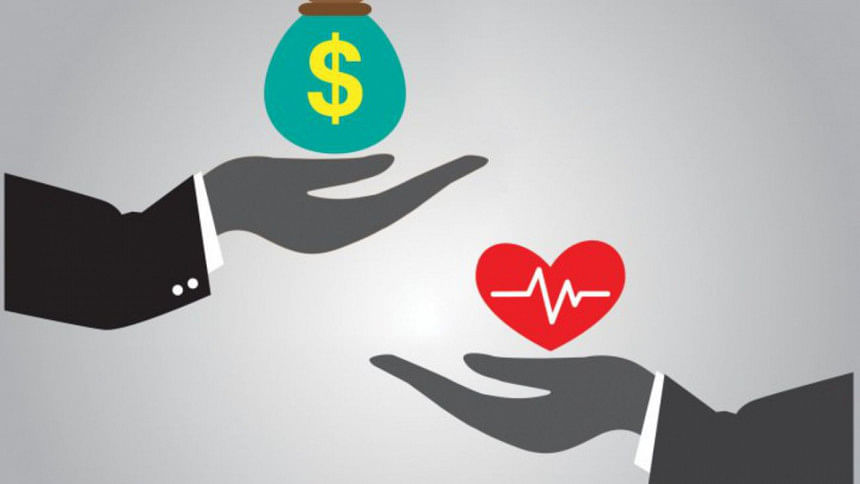Ask first, walk later

After taking the vitals of my mother, the nurse at this hospital in Bangkok, Thailand asks me in a soothing melody: "Yoll mathall blood pleshull high flom walkeeng to this loom?"
I answer, subconsciously in a similar tune: "No. Her blood pressure is high from trying to communicate with everyone in this hospital in English!"
She smiles and politely nods in affirmative from obviously not getting the joke. In fact, during the last 15 minutes of our conversation with her, I notice that she nods at every question asked. Good, if it were another world, like, when asking for a thousand bucks. But these are vital questions at the pre-operative stage, though the same questions have been asked several times earlier and the answers obviously not shared with the various functionaries in the hospital.
"So, you want my mother to sign this form? But it's in Thai, is there an English version?" I ask.
She nods, "Yes."
"Ok, so, can we get that form?"
"Yes."
"Ok, great, can you get that for us?"
"Yes." She's still standing there. "English form? Yes, we no hab. Only Thai."
Urgh! I am about to ask, "Can you please check my blood pressure?" I refrain myself. Gotta keep it simple—verbs, adverbs, pronouns, prepositions, conjunctions, abbreviations…OUT! Just nouns, nouns and nouns and perhaps a verb as an exception and as a last resort. No wonder I notice such a huge, separate department here called Hypertension…
If health tourism is a multimillion dollar industry in Thailand with millions invested in know-how, doctors, equipment, facilities, infrastructure, marketing and best in class hygiene, just invest 400 Baht per person and have our "800 Taka English or Your Money Back" guys come and teach you a few tricks. At least our five-star hotels, I mean, hospitals in Dhaka can boast better language skills.
But the Thai staff is aware of their language limitations. As such, they are patient with the patient and with the patient's highly patient family members who may have heart attacks soon and become patients themselves. They give you all the time in the world to make sure BOTH patient and staff agree to say "yes" in unison AND with full comprehension (hopefully). What is even better is that the doctors spend an equal amount of time explaining the medical conditions, the procedures, the risks and the benefits. It's a good thing that even these highly qualified professionals struggle with the universal language, though to a much less extent. That gives us plenty of time to digest all the information and formulate our own questions, only to throw the doctor into another trauma of formulating a new string of sentences to answer our questions.
What is more interesting is that the doctor spends a similar amount of protracted time in explaining the fully itemised costs of the procedure, and what may be needed should an additional procedure be needed while in surgery and that the full amount needs to be paid up front for the optional procedure, to be fully refunded should that additional procedure be needed. I'm impressed—this is the first time I'm seeing a white-apron-wearing accountant.
I am instantly transformed back to Dhaka where I'm summoned into the operating room. Surprised that I should be entering a sterile environment in my street clothes, I follow the nurse in. It's my brother lying unconscious, eyes rolled up, with all the paraphernalia fully inserted during a colonoscopy procedure. The doctor points to the monitor, "There's a polyp in there. It's totally benign. If you give us permission we'll cut it off."
I would ask my brother. After all, it's his polyp. But I think he's a little busy right now. So, I give the permission and am about to quickly leave the room lest I spread more germs into the sterile environment.
"It will be Taka 18,000. Is that ok?" The doctor tells me.
I draw a blank for a second.
"That's 18,000 Taka extra to cut off the polyp. Ok?" He adds.
I surely wasn't going to be my typical anal retentive self on haggling with a non-negotiable price tag.
"Yes, yes, fine. Go ahead with the procedure." I say hurriedly.
"You have to go downstairs to the Accounts section and make the payment now. Ok?"
"Ok, ok!!" Jeez! !@#$%^&*!! I was about to say, "Did you want me bring you the receipt before you start the polyp cutting ceremony?"
But I guess they have faith in the fact that I love my kid brother to the point that I wouldn't dare disobey them. Besides, they have a 5 feet 7 inch hostage lying there with a hose pipe shoved up his…
So, one thing is evident. Healthcare in our part of the world is like a prepaid mobile phone SIM card—pay first, walk (after being made healthy) later. A far cry from Uncle Sam's land where there is the Emergency Medical and Treatment Labor Act (EMTLA), mandating hospitals, both public and private, to treat first, ask questions later during an emergency visit in a system where even one single suture for a tiny laceration costs thousands of dollars. Of course, this paves the path for the clever (Bangladeshi) with the prior knowledge of him needing an immediate quadruple bypass surgery, to walk into the emergency room of a US hospital with severe chest pain that "started all of a sudden", only for the hospital to determine "a surprising" four blockages that require an immediate surgery!
Set aside the clever. As for the affluent Bangladeshis, they flock to the pricier and prepaid Singapore, paying premium to relieve themselves of the language stress faced in Thailand. And if you are in a life-threatening emergency, you'd better be able to charter a plane, prepaid.
Oh by the way, today's column is about the healthcare of the affluent, the wannabe affluent, the struggling-to-be-affluent and for the clever. As for the rest, i.e. the majority, may the Lord have Mercy on us…
Naveed Mahbub is an engineer at Ford & Qualcomm USA and CEO of IBM & Nokia Siemens Networks Bangladesh turned comedian (by choice), the host of ATN Bangla's The Naveed Mahbub Show and ABC Radio's Good Morning Bangladesh, the founder of Naveed's Comedy Club.
E-mail: [email protected]





Comments